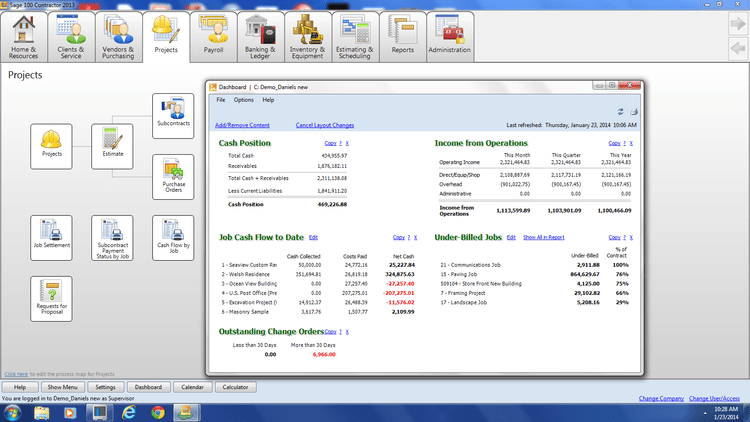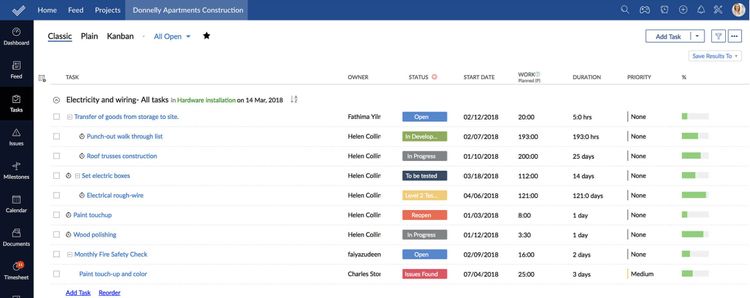Construction Management vs. Project Management: Main Differences
What is the difference between a construction manager and a project manager? Surprisingly, it’s quite a bit, and it’s important for construction industry firms to understand the key differences to ensure success in their construction projects.
In short:
- Construction managers handle the management and control of the construction phases of a project
- Project managers deal with the management and control of a single project during all phases of development
Explained further in the article, the main similarities and differences include:
| Similarities | Differences |
|---|---|
| - Project oversight - Use of consultants |
- Expertise - Software used - Client and contractor relationship - Main responsibilities |
It isn’t as simple as one dealing with construction and the other with projects. Historically, project management was considered to be the work performed from the ideation stage all the way through to handover, whereas construction management only occurred during the actual construction phases. However, these lines and roles can often be blurred today.
While the terms “construction management” and “project management” are often used interchangeably, taking a closer look into the roles of both construction and project managers, as well as the expectations each type of management provides for a successful project, and you’ll notice key differences: responsibilities involved, the authority level of the manager, and the scope of the work being performed.
What is Construction Management?
Construction managers are involved in the “day-to-day” operations–overseeing specialized contractors and other personnel to schedule and coordinate all construction processes necessary to complete a project. These professionals are part of the larger construction management team that uses specialized project management techniques to oversee project planning, design, and construction.
Construction managers are the key users of construction management software, which is a combination of applications that improve decision-making in performing the necessary planning, building, and task management in construction projects. This software includes construction accounting, job costing, project management, and more. This software can also be used by project managers, engineers, contractors, and architects.
Construction managers are more involved in managing a specific construction project. The CM is generally an expert in their particular trade, such as carpentry, plumbing, or general construction. Like managers in other industries, they handle the day-to-day operations from pre-construction through the end of a project. They deal with personnel and equipment issues and ensure they have the right materials on hand to complete the job.

What is Project Management?
Project managers tend to be involved in more “big picture” scenarios. Because of this, the biggest difference between them and a construction manager is how broad their scope is. Project managers are responsible for all aspects of the construction project and managing financials (such as construction and project budgeting, procurement, and determining building codes). Because of this, project managers tend to come from an administrative background and may not work directly on a construction site (or job site).
The project manager’s goal is to ensure a project is completed on time and within the project budget. This can be accomplished through project management software, which coordinates the execution of project tasks. This includes project schedule planning, resource allocation, quality management, time tracking, and collaborative document sharing. Responsible use of PM software will increase customer satisfaction through decreased project cycle times and better deadline projection accuracy.
Project managers use PM tools to improve labor and equipment utilization through better workflow scheduling. These tools help your team collaborate better by outlining the tasks they need to complete, in what order they should be done, and what resources they require. Better collaboration between team members and external project stakeholders can reduce instances of rework.

Main Similarities
Project Oversight
Construction management and construction project management will both ensure that all aspects of construction are executed safely and efficiently for the owner, on time, and on budget.
Both construction management and project management will involve the same three parties:
- The client
- The consultant
- The contractor
Use of Consultants
Both CM and PM involve consultants who represent the client. Likewise, all communication between clients and contractors flows through the consultants. General contractors (or subcontractors, if necessary) will perform the construction work. The consultants are responsible for developing and implementing construction documents, observing the work being performed, managing inspections, and reviewing any documents and/or change orders submitted by either party.
Regarding qualifications, both positions (that of a construction project manager and a construction manager working in building trades) will likely require a Bachelor’s Degree–although this is more of a suggestion rather than a requirement.
Main Differences
Expertise
On a particular job, you could have both a project manager and a construction manager, each bringing certain expertise that comes together during project delivery. A construction manager oversees the specific trades in the field (such as electrical work, plumbing, mechanical, and carpentry); the project manager brings in expertise that deals with the overall project from beginning to end–including project budgeting, designers, and consultants (engineers, legal team, information technology, etc.).
Software Used
By reviewing all costs and change orders, project management software can help vet key changes to ensure the client is not being overcharged or your business is not paying too much to complete the project. Meanwhile, construction management software worries more about decision-making when performing the day-to-day building tasks and overall task management in construction projects. That’s not to say they are overtly different systems because sometimes there is a large crossover of functionality between the two.
Client and Contractor Relationship
In project management, contractual relationships are developed between project managers, the client, and the contractor. A significant difference between construction managers and project managers is the relationships they have between these parties. For example, a project manager and a contractor have no formal contract between them. They both contract directly with the client, and the client pays the contractor. For the construction manager, the contractor has no direct contract with them, and there is no agreement with the client. The construction manager pays the contractor.
A project manager will let the client select the contractor. Meanwhile, the construction manager has greater responsibility for selecting the contractor but usually does so with the client’s agreement.
Responsibilities
Regarding liability, the project manager is liable for the design process work, while the contractor is liable for the construction work. If a client makes any changes without approval from the PM, the client is the one who assumes responsibility. This means the client generally is dealing with two entities simultaneously. Meanwhile, the construction manager is responsible for both the design and construction work (if no project manager is involved). The contractor is responsible to the construction manager for the work performed. This allows the client to only deal with one entity (the CM).
